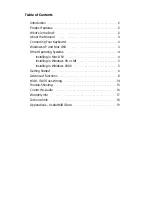
Training and operating instructions
38
GB
With hand pulse
An extra-low voltage caused by the contractions of your
heart is registered by the hand sensors and evaluated by
the electronics assembly of the device.
• Always grab the contact faces with both hands.
• Avoid jerky grasping.
• Hold your hands calmly and avoid contractions and
rubbing on the contact faces.
Comment:
Only one way of pulse measurement is possible: either
with ear clip or with hand pulse or with breast belt. If no
ear clip is located in the pulse plug, hand pulse measure-
ment is activated. If you insert an ear clip in the pulse
plug, hand pulse measurement is automatically deactiva-
ted. It is not necessary to disconnect the plug of the hand
pulse measurement.
Faults in the Training Computer
If the computer display is not functioning correctly, please
remove the power supply and switch off the machine.
General information
Calculation of fitness score
The computer calculates and assess the difference bet-
ween the training and recovery heart rate and the resul-
ting "fitness score" according to the following formula:
P1 = Training pulse
P2 = Recovery pulse
Score 1 = very good
Score 6 = poor
A comparison of the training and recovery heart rate is a
quick and easy way in which to determine physical fitn-
ess. The fitness score is an orientation value to asses your
recovering ability after physical exercise. Before pressing
the recovery heart rate button and determining your fitn-
ess score, you should train at your own level of intensity
for a significant period of time e.g. 10 minutes. For regu-
lar cardiovascular training you will discover that your
"fitness score" improves.
Possibilities for Pulse Measurement
The pulse measurement starts as soon as the heart in the
display blinks in time with your pulse beat.
With ear clip
The pulse sensor works with infrared light and measures
the variations in translucence in your skin, which are pro-
duced by your pulse beat. Rub your ear ten times strongly
to activate the blood circulation before attaching the
pulse sensor to your earlobe.
Avoid disturbing pulses.
• Attach the ear clip properly to your earlobe and look
for the best point for the measurement (heart symbol
blinks without interruption).
• Do not train directly under strong incidence of light,
e.g. neon light, halogen light, spotlight, sun light.
• Completely eliminate any shocks or bounces of the ear
sensor and the cable. Always attach the cable with a
clip at your clothing or, even better, at your headband.
With breast clip
The internal pulse receiver is compatible to un-coded
POLAR chest strap transmitters. For coded systems, wrong
pulse values may be displayed. We recommend T34 by
POLAR. Please observe the corresponding instructions.
A plug-in receiver is not necessary and should not be used
for technical reasons.
Note (F) = 6 –
(
10 x (P1 – P2)
)
2
P1
✓
✓
optional
✓
optional
optional
For Your Safety:
Before beginning your program of exercise, consult your
doctor to ensure that you are fit enough to use the equip-
ment. Base your program of exercise on the advice given
by your doctor. Incorrect or excessive exercise may
damage your health.















































